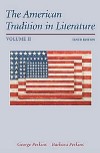In his first book, A Week on the Concord and Merrimack Rivers (1849),
Thoreau comments on a range of subjects--social, aesthetic, and literary--stimulated
by an excursion he made with his brother, John, in 1839, less than two years
before he died in 1841. Thoreau's "Walden, or Life in the Woods,"
the only other book published in his lifetime, is one of the major works of
the Romantic Period in American literature and considered by many readers to
be one of the classics of world literature. First published in 1854, the extended
essay chronicles his two years spent in a small cabin on the northern shore
of Walden Pond, a small body of water about two miles south of his home in Concord,
Massachusetts, between March, 1845, and November, 1847. Thoreau's most celebrated essay is "Civil Disobedience," his challenge for people to serve first their "moral sense" and to reject what that agency of intuition fails to ratify. Inspired by his night in the Concord city jail in 1846 for refusing to pay his poll tax, Thoreau's essay influenced the concept of non-violent public protest in the American civil rights movement in the 1960's and Gandhi's non-violent campaign against the British in India. |



 2003 McGraw-Hill Higher Education
2003 McGraw-Hill Higher Education